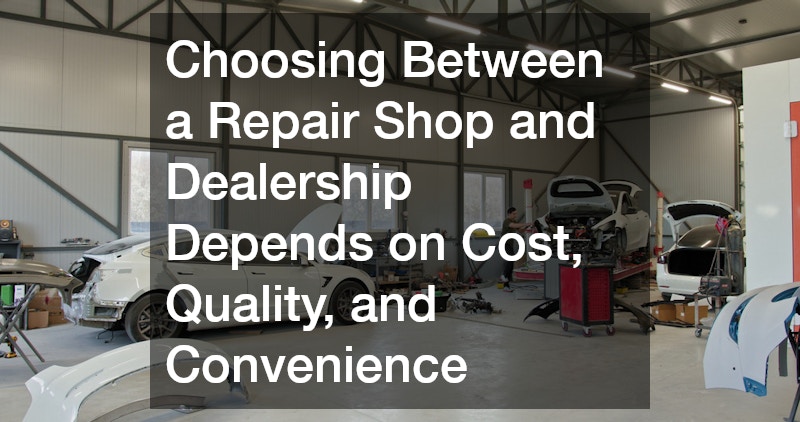In the ever-evolving world of automotive maintenance, car owners often find themselves at a crossroads: should they opt for an independent auto repair shop or head to their local dealership? Each choice comes with its own set of advantages and disadvantages that can affect the quality, cost, and convenience of repairs. This article delves into the key considerations when deciding between independent and dealership auto repair, helping you make an informed decision that best suits your needs.
What are the cost differences between independent and dealership auto repair?
Pricing Transparency and Variability
Independent repair shops often have the flexibility to set their own pricing structures, which can result in more affordable services than dealerships. This pricing variability can be both an advantage and a disadvantage, as some shops may offer competitive rates while others might not.
In contrast, dealerships generally provide more standardized pricing, which can include premium charges due to their brand and specialized equipment. Despite the potentially higher costs, some consumers prefer the transparency and predictability of dealership pricing.
Important to note is that dealerships commonly use Original Equipment Manufacturer (OEM) parts, contributing to the overall cost. Independent shops may offer OEM or aftermarket parts, providing customers with more budget-friendly options.
Long-Term Value
Choosing between an independent shop and a dealership often involves considering the long-term value of the repair versus the immediate cost. While independent shops may offer lower upfront costs, the availability of aftermarket parts can impact the longevity of repairs.
Dealerships, on the other hand, emphasize using OEM parts, which can enhance the durability and longevity of vehicle repairs. This focus on quality not only sustains vehicle performance but can also increase resale value.
Ultimately, the long-term value varies by individual needs, considering factors such as how long one plans to keep their car and the importance placed on using OEM parts. Thus, evaluating both current and future considerations is essential when making this decision.
How does the quality of service compare between independent and dealership repairs?
Certifications and Expertise
Dealership technicians typically undergo rigorous training and certification processes tied to the specific manufacturer. This specialized knowledge can be particularly beneficial for newer or complex vehicle models.
Independent shops often employ certified mechanics, although their expertise may span various makes and models, offering a broader, albeit less specialized, skill set. This versatility can be a significant advantage for owners of older or non-mainstream vehicles.
Regardless of the setting, expertise varies significantly, and it is always advisable to research the qualifications and reputation of the shop and its technicians. This diligence ensures the best service quality for any situation.
Warranty and Guarantees
Dealerships generally offer robust warranties and guarantees on their repairs, bolstered by strong manufacturer backing. These warranties not only offer peace of mind but also reinforce the commitment to high-quality service.
Independent shops may also provide warranties, though these can vary greatly and may not be as extensive as those from a dealership. However, they often try to match or even exceed customer expectations to maintain their competitive edge.
Ultimately, evaluating the types of warranties and guarantees provided can guide one’s choice, helping to ensure comprehensive coverage aligned with individual needs. Proper research can make certain that the chosen service offers the necessary assurances.
How does convenience factor into choosing between independent and dealership repairs?
Location and Accessibility
The location of the repair facility plays a crucial role in the ease and convenience of getting a vehicle serviced. Independent shops are often more geographically dispersed, providing greater accessibility for car owners in various locales.
Dealerships, however, are typically located in more central areas, making them convenient for those living or working nearby. Their placement often correlates closely with the brand’s sales locations, reinforcing a brand-aligned convenience.
Proximity can be a decisive factor, as the need for transportation or commute time significantly influences the repair experience. Assessing location accessibility can guide more practical and logistics-friendly decisions.
Customer Experience and Additional Services
The customer experience at independent shops can be more personalized, with a focus on building a trusting relationship with clients. Many offer flexibility in appointment scheduling, direct communication with mechanics, and personalized vehicle care advice.
Dealerships often provide a more standard experience but are noted for additional conveniences, like complimentary shuttle services, expanded service hours, and amenities such as waiting lounges. These services cater to busy schedules, adding value for many customers.
Choosing between personal interaction versus corporate consistency depends on individual preferences and the consumer’s value of additional service offerings. Thoughtful consideration of these factors can enhance the overall service experience.
Choosing between an independent repair shop and a dealership involves weighing various factors like cost, quality, and convenience. Both options offer unique advantages and trade-offs, and the best choice often depends on personal priorities and circumstances. Understanding these aspects can lead to more satisfied decisions and, ultimately, a better vehicle maintenance experience.

